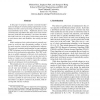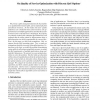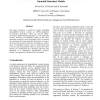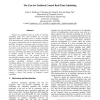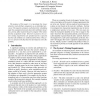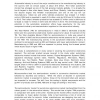119
click to vote
RTAS
1999
IEEE
15 years 6 months ago
1999
IEEE
Unique challenges are present when one tries to build distributed real-time applications using standard o -the-shelf systems which are in common use but are not necessarily design...
126
Voted
RTAS
1999
IEEE
15 years 6 months ago
1999
IEEE
In this paper we propose a dynamic constraint transformation technique for ensuring timing requirements in a distributed real-time system possessing periodically synchronized dist...
118
click to vote
RTAS
1999
IEEE
15 years 6 months ago
1999
IEEE
We present a QoS management framework that enables us to quantitatively measure QoS, and to analytically plan and allocate resources. In this model, end users' quality prefer...
RTAS
1999
IEEE
15 years 6 months ago
1999
IEEE
This paper describes the design and performance of a realtime I/O (RIO) subsystem that supports real-time applications running on off-the-shelf hardware and software. This paper p...
129
click to vote
HASE
1999
IEEE
15 years 6 months ago
1999
IEEE
The paper introduces a method to model embedded dependability-critical systems as AND-composition of Guarded Statecharts which are special UMLstatecharts. With Guarded Statecharts...
121
click to vote
ECRTS
1999
IEEE
15 years 6 months ago
1999
IEEE
Despite the significant body of results in real-time scheduling, many real world problems are not easily supported. While algorithms such as Earliest Deadline First, Rate Monotoni...
110
click to vote
ECRTS
1999
IEEE
15 years 6 months ago
1999
IEEE
The purpose of this paper is to investigate the issues related to task attribute assignment on an individual processor. The majority of papers on fixed priority scheduling make th...
101
click to vote
ECRTS
1999
IEEE
15 years 6 months ago
1999
IEEE
This paper compares the performance of three classes of scheduling algorithms for real-time systems in which jobs may overrun their allocated processor time potentially causing th...
125
click to vote
ECRTS
1999
IEEE
15 years 6 months ago
1999
IEEE
Many industrial applications mandate the use of a timetriggered paradigm and consequently the use of off-line scheduling for reasons such as predictability, certification, cost, o...

